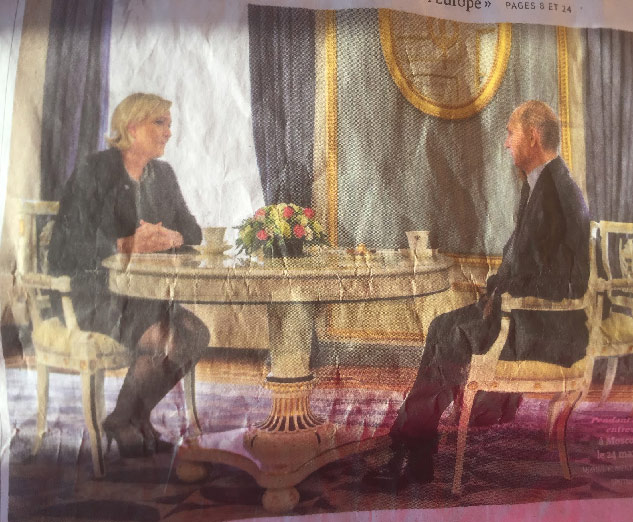Of course, Brexit got plenty of coverage in Le Monde last week, starting the weekend of the gathering in Rome to celebrate 60 years since the signing of the eponymous Treaty. In the first paragraph of the report, an EU official called Neil Thomson, appears draped in an EU flag, with a sign in his hand, advancing gently towards the Bocca del Verita. ‘British – “Scottish”, he corrects quickly. “I have never been a nationalist, but if it allows us to stay in Europe, why not?”’
The front page of the paper on this historic day was devoted to an image of Marine le Pen at the Kremlin, taking coffee with Putin as the EU leaders met together in Rome. The pair are seated at a white and gold table, in an opulent room with gilded detail on the walls and a gilt mirror reflecting a gold motif on the white door.
Le Pen leans forward in her chair. knees pressed together, fingers enlaced, her head tipped in a submissive attitude, like the mother of a suspended pupil pleading with a strict headmaster. At the other side of the table sits Vlad himself, side-on to the camera, manspreading, elbows on the arms of the chair, hands dangling between his legs.
The headline reads: “Marine Le Pen, knighted at the Kremlin by Vladimir Putin” and below is a trail for an editorial on page 24: “Putinism, the spectre that haunts Europe”. This discusses the model which Le Pen admires; an authoritarian regime where opponents are assassinated, international law is violated such as over the Crimea, support is offered to Bashir Assad’s regime in Syria.
Brexit, the editorial goes on, is one of triple threats the EU is facing, along with the migrant crisis and financial pressures on the Eurozone. It is a difficult moment. But the paper points to the peoples of Austria and the Netherlands who have refused to elect populist leaders of the far right. All is not lost. The future and freedom of France, the paper concludes, lie in Europe.
In the business pages, Brexit also figures, in a report of May’s reassuring words to bankers at a dinner in the city; and another about the dream of the anglophone world, in which Brexiteers hope that a Britain freed from the EU, can reconnect – and this sounds faintly offensive in French – with its “natural” friends and allies. Another reports that Paris is battling with Frankfurt over the chance to win business from banks moving some of their operations out of London – but nobody is making any plans until the result of the French election is known. “The city is packing its boxes – a few at least.”
If Le Pen were to win, it would be the third result, after Brexit and Trump, to overturn the polls and shock the world. The polls predict that Le Pen will win a place in the run-off of the two first placed candidates from the initial round, but that she will lose to Emmanuel Macron, the 39 year old social democrat in the second. In an interview, Macron warns against complacency, citing Brexit and Trump’s victories.
France and Europe are holding their breath for the result of the French election. Personally, I hope that the frankly embarrassing example of Britain’s populist government blundering its way towards le Brexit, may put sensible French voters off populist far right candidates. The fact that British politicians even raised the possibility of war with Spain four days after triggering Article 50 ought to be some reminder of where “blood-and-soil” nationalism leads. To blood and soil, usually.
Le Monde is not prone to sensationalism. In an article about the Gibraltar situation, it observes merely that here, and in the situation with Scotland, Brexit throws a spotlight on the re-emergence of bilateral conflicts which were previously contained within the structures of the European Union.

